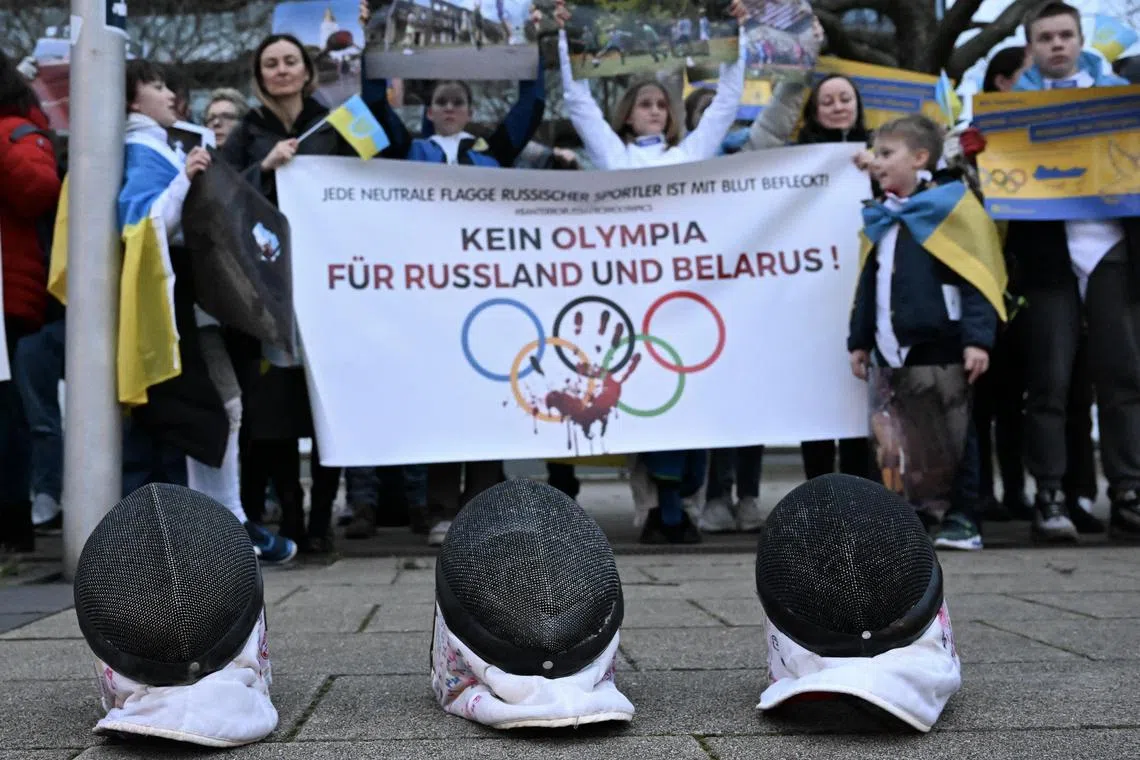Fencing: Hundreds of fencers issue plea to IOC over Russia, Belarus decision
Sign up now: Get the biggest sports news in your inbox

Ukrainian refugees protest against any participation of Russian and Belarusian athletes at the Paris 2024 Olympics.
PHOTO: REUTERS
LONDON – The International Olympic Committee (IOC) on Tuesday issued recommendations for the gradual return to international competitions for Russian and Belarusian athletes, with president Thomas Bach saying their participation “works” despite the ongoing war in Ukraine.
The IOC executive board’s recommendations relate only for the return of those athletes in international competitions but not the 2024 Olympics, for which a separate decision will be taken at a later date, he said.
Bach said the recommendations for event organisers and sports federations to follow include Russian and Belarusian athletes competing as neutrals, with no flag or anthem.
They cannot take part in team events and have to have a proven drug testing record.
Athletes who support the war or are contracted to their countries’ military or national security agency cannot take part.
The IOC had sanctioned Russia and Belarus after the February 2022 invasion but it is now eager to see athletes come back across all sports and have a chance to qualify for the Paris Games.
A dozen countries boycotted the women’s world boxing championships earlier in March in New Delhi in protest at their presence at the event, while earlier on Tuesday, more than 300 fencers have asked the IOC and fencing’s global federation to reconsider allowing Russian and Belarusian athletes to compete
A letter sent to Bach and Emmanuel Katsiadakis, the interim president of the International Fencing Federation (FIE), comes just days before the window for 2024 Paris Olympic qualifying opens.
It was signed by current and retired fencers from across Europe, plus the United States, Canada, Mexico, Brazil, Chile and Japan.
The IOC set out a pathway in January for competitors from the two nations to earn Olympic slots through Asian qualifying and to compete as neutral athletes in Paris.
The decision to clear Russian and Belarusian athletes to participate in international fencing events was made on March 10 at the FIE Extraordinary Congress.
“With complete disregard for athletes’ voices, you have permitted both Russia and Belarus back into FIE competitions, as well as a suspected tournament hosted on Russian soil,” the letter from the fencers said.
“This is an apparent break of the IOC’s position... and once again exposes Russian interests outweighing the voice and rights of athletes, especially those from Ukraine.”
The inclusion of Russia and ally Belarus has already muddied the Olympic qualifying landscape, with Germany announcing it was bowing out of hosting an FIE World Cup and Poland considering doing the same.
“Nothing is sure at the moment... and nobody knows how this is going on, how this can happen?” German fencer Lea Kruger told Reuters.
World Cup results from April 3, 2023 to April 1, 2024 contribute important world ranking points towards Olympic qualifying.
“It’s still hard to say the (Russian) athletes cannot compete because they also have Olympic dreams. But, on the other hand, you have the interests of Ukrainian athletes. They have to run away. They are dying in this war,” Kruger said.
According to international athlete-led organisation Global Athlete, 343 sport facilities in Ukraine have been destroyed, leaving an estimated 140,000 young athletes without facilities, while 40,000 Ukrainian athletes are training abroad.
The figures cover all sports in Ukraine.
“What more has to happen to sanction a state for something, when (Russian President Vladimir Putin) is breaking the principles of sport? One of the most important principles is peace,” added Kruger, who said that some of her fellow fencers were unsure of signing the letter, fearing retribution.
The fencers acknowledged in the letter that the IOC and world federations are walking a fine line with sanctions, given the underlying mission of sport as unifying and peacemaking.
“(But) this egregious, unprovoked war and its breach of the Olympic Truce cannot be ignored or rewarded,” they wrote.
“Returning to business as usual would be a catastrophic error.”
REUTERS


